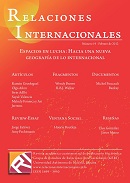Keywords:
modernidad, colonialidad, decolonialidad, heterarquía, poscolonial, dispositivo, modernity, coloniality, decolonial, heterarchy, postcolonial, dispositiveCopyright (c) 2012 Melody FONSECA, Ari JERREMS

This work is licensed under a Creative Commons Attribution-NonCommercial-NoDerivatives 4.0 International License.
Abstract
In recent decades the social sciences have been deconstructed by different strands of critical thought that strive to analyze the contemporary world system, global politics and social relations from alternative paradigms and epistemologies allowing us to understand the different temporalities and locations of power and knowledge. One of the most recent movements is what has been called Decolonial thinking. This proposal originates within critical debate in the social sciences, originally in Sociology, History and Political Economy and more recently in International Relations. Decolonial thinking takes a critical approach to established postcolonial studies. Driven by Latin American scholars forming part of the modernity/coloniality/decoloniality project, Decolonial thinking invites us to question European modernity considering its antithesis, colonialism in America, and the effects of Coloniality of power, knowledge and being, on the global colonial subject. In this article we evaluate the contributions Decolonial thinking may offer to International Relations theory, and at the same time, how it may add to other critical theories in order to contribute to the pluriversal dialogue that these authors propose.





